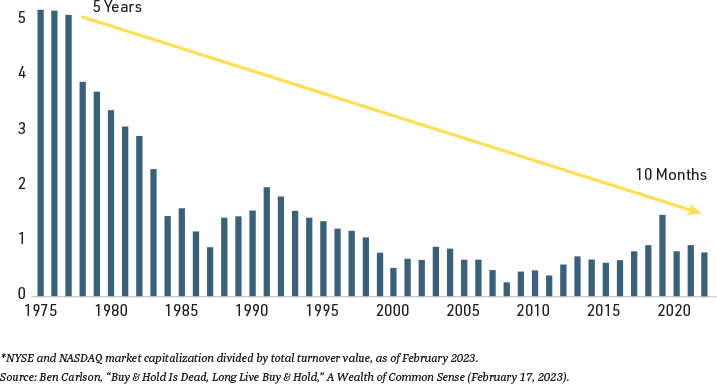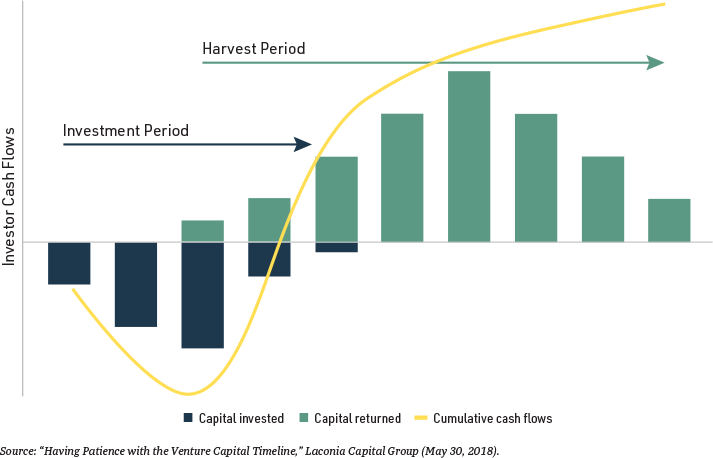Investments & Wealth Review — The Importance of Patient Capital
Jun 26, 2025 11:08:00 AM
In the May/June 2025 edition of Investments & Wealth Review, author Michael Collins explores how patient capital and “time arbitrage” can give investors an edge in markets dominated by short-term thinking. He explains that by extending investment horizons, tuning out short-term noise, and embracing illiquidity, investors can capture compounding returns. Drawing on venture capital strategies and real-world examples like Airbnb, Collins shows how patience and strategic foresight can unlock outsized rewards.
Michael Collins is founder/chief executive officer of Alumni Ventures, which provides accredited investors and institutions with access to professionally managed, diversified venture portfolios. He earned an undergraduate degree in engineering science from Dartmouth and an MBA from Harvard Business School.
The Importance of Patient Capital
How Time Arbitrage Delivers Investment Edge
We live in an era of instant gratification. From one-click shopping to 280-character tweets, technology has conditioned us to expect immediacy. Dopamine-driven apps and 24/7 news cycles keep us stimulated—and impatient.
This trend has impacted investing as well. In the 1960s, the average stock was held for eight years (see figure 1). Today, it’s traded after just a few months. Investors fixate on quarterly reports, stock tickers, and breaking news, often at the expense of long-term strategy.
FIGURE 1: Average U.S. Equity Holding Period (Years) as of February 2023
This short-term mindset creates market inefficiencies that patient investors can exploit. Present bias, loss aversion, herd mentality, and short attention spans lead to mispriced opportunities, where long-term investors can earn outsized returns from compounding and illiquidity premiums. They buy what the short-sighted are selling and hold when others fold.
What Is Time Arbitrage?
In investing, time arbitrage is the practice of maintaining a longer-term perspective than the average investor. It means seeing value where others are too focused on short-term gains to notice. As Warren Buffett famously said, "The stock market is a device for transferring money from the impatient to the patient."[1]
The majority of private market strategies require this mindset, but it’s fair to say that venture capitalists (VCs) most embody this approach. VCs spend their time evaluating companies that won’t mature for years. They extend their time horizons, capitalizing on the gap between society’s addiction to short-term feedback loops and the substantial rewards that come to those who think in five-year chunks—or even decades.
In a world increasingly obsessed with the present, time arbitrage can be a valuable investment edge. This article explores how venture capitalists leverage behavioral economics to make money by doing what others often won’t: waiting.
The Science of Time Preference
Present bias — the tendency to favor immediate rewards over significantly larger future ones — is a fundamental human instinct.
A classic experiment illustrates this. Given the choice between $100 today or $120 in a week, most people take the instant cash, even though waiting just seven days would yield a far better return. However, when asked to choose between $100 in a year or $120 in a year and a week, people suddenly become willing to wait for the extra $20.
In other words, we are impatient in the short term but much more rational when the delay feels distant. Our brains exponentially undervalue long-term outcomes, making it difficult to prioritize future rewards over instant gratification.
By overcoming present bias and valuing the future more appropriately, VCs position themselves to reap the outsized rewards of long-term compounding growth that others pass up. Venture capital is a "get-rich-slow" proposition.
The Trap of Acting Too Quickly
Modern technology and media have wired investors for short-term thinking. We are bombarded with real-time updates, and this relentless stream trains our brains to expect instant feedback, creating a fear of missing out (FOMO) — the urge to act quickly before it’s too late.
As a result, investors often overreact to short-term events. A single bad earnings headline can send a stock into a tailspin, even when the company’s long-term prospects remain intact. Too much weight is placed on immediate factors, and the bigger picture is ignored.
Cognitive Inefficiencies Ripe for Arbitrage
This frenetic short-term focus creates market mispricings, which are opportunities that patient, strategic investors can exploit. As legendary investor Bill Miller observed, "In an environment with massive short-term data overload and with people concerned with minute-to-minute performance, the real inefficiencies are found beyond, say, 12 months." [2]
In other words, the market for quick gains is competitive, with opportunities scarce; the market for long-term value remains less crowded.
Smart VCs and investors step into this gap. They tune out daily noise and look for opportunities that may take years to materialize. In doing so, they act as arbitrageurs of time by buying what short-term traders sell cheap.
VCs as Structural Time Arbitrageurs
Long-Term Capital, Outsized Rewards
Venture capitalists are structural time arbitrageurs by design. VCs raise funds with the understanding that capital could be locked up for 10-plus years, a timeframe that is unthinkable to most traders and public market investors. This long-term capital base allows VCs to invest in opportunities that require years to mature. See figure 2 for an illustrative view of the venture capital investment experience from capital deployment, realizations, and the return of proceeds.
FIGURE 2: The Venture Capital Timeline
The payoff for this patience can be extraordinary. VCs invest when companies are just being born and have to stay with them through childhood and adolescence—it can be a long wait for true maturity to appear. Early investors in companies such as Amazon and Uber had to wait years for profitability or an initial public offering (IPO), but those who held on ultimately earned hundreds or even thousands of times their initial investments. Although these are outlier examples, one great investment can be life-changing.
Such is the power of underappreciated compounding. A startup growing revenue at 50 percent per year may seem modest at first, but over a decade, that’s transformative growth. By staying the course, VCs capture the exponential upside that quarterly focused investors miss.
In fact, the inability to sell on impulse forces investment compounding and investor patience. The two together have enabled venture capital to deliver strong returns.
Illiquidity Premium and Strategic Patience
Because VC investments are illiquid—you can’t just sell a startup stake on the open market—investors demand higher returns for this inconvenience. Historically, private equity and venture funds have earned an illiquidity premium of 3–5 percent per year above public market returns.
In simple terms, patient money earns extra returns.
This is time arbitrage in action. VCs earn more because they are willing to lock up capital while others demand liquidity.
Ironically, illiquidity can be an advantage. It prevents emotional selling when the news isn’t promising and reinforces strategic patience. As Amazon founder Jeff Bezos put it back in 2011: "If everything you do needs to work on a three-year time horizon, then you’re competing against a lot of people. But if you’re willing to invest on a seven-year time horizon, you’re now competing against a fraction of those people, because very few companies are willing to do that."[3]
Loss Aversion and Fear of Uncertainty
Humans are hardwired to avoid loss at all costs.
The possibility of failure looms larger than the probability of success, making many mainstream investors overvalue risk. They demand unrealistically high returns before considering a risky venture, often much higher returns than a rational assessment would suggest. As a result, they may pass on a startup with 5x potential simply because there’s a 30-percent chance of failure, even if the expected value remains highly positive.
Venture capital operates under a power law dynamic, where a handful of winners can more than compensate for losses. In VC, the downside is capped at 1x your investment, but the upside can be 20x, 50x, or even 1,000x. The key is having a large enough portfolio to capture the outliers.
Unlike traditional investors, VCs understand that uncertainty and opportunity go hand in hand. For example, in the early stages of transformative technologies—whether artificial intelligence, nuclear energy, or space technology—the high uncertainty level deters many investors. Yet when risk is perceived as high, valuations are often artificially low. VCs capitalize on this by leaning into uncertainty, securing favorable entry prices and terms on deals that others pass up.
VCs also manage loss aversion through a diversified portfolio strategy, accepting that seven out of 10 startups may fail but knowing that one breakout success can offset those losses many times over. This probabilistic mindset allows them to overcome the fear of loss that might paralyze other investors.
That’s one reason VCs encourage investors to build portfolios with upward of 50 or more companies, investing alongside strong lead investors where the biggest opportunities tend to emerge. It’s all about maximizing the probability of making transformative investments.
Airbnb’s Early Rejection: A Lesson in Time Arbitrage
Few stories illustrate time arbitrage better than Airbnb’s origin. In 2008, Airbnb’s founders were desperate for funding, pitching their home-sharing idea to seven prominent investors in hopes of raising $150,000 for 10 percent of the company.
All seven passed. Why? Their responses reflect common behavioral biases. One dismissed the idea because "the market opportunity didn’t seem large enough." At the time, almost no one was renting rooms to strangers—it seemed niche, even absurd. Their present bias was clear. They anchored to the existing market size and failed to imagine what it could become. Another rejected it because it was "not in our focus area," sticking rigidly to familiar territory. In hindsight, these investors were blinded by status quo thinking and fear of the unproven. [4]
Airbnb went on to create an entirely new industry and is now worth around $100 billion. Had any of these investors written that $150,000 check, they would be worth billions today.
This case highlights how behavioral biases such as anchoring to the present, narrow framing, and fear of uncertainty have led even smart investors to undervalue a revolutionary idea. The VCs who overcome these biases can earn a life-changing arbitrage on time and insight.
The Dopamine Economy and Its Impact on Investor Behavior
A Microsoft study found that between 2000 and 2015, the average human attention span shrank from 12 seconds to just 8 seconds—shorter than a goldfish’s 9-second attention span. [5]
Dopamine, often called the "feel-good" hormone, plays a major role in our pursuit of pleasure, whether it’s the high from a shopping spree or a slice of pizza. We now live in the "dopamine economy," a world where digital products hijack our brains’ reward system. Each ping, like, and notification delivers a small dopamine hit, conditioning us to crave instant gratification. Over time, this has eroded our ability to concentrate, and sustaining long-term focus has never been harder.
For investors, this manifests as itchy trigger fingers. Investors are constantly checking portfolios, reacting to every fluctuation, and chasing the thrill of action. With the rise of commission-free trading apps, investing has morphed into entertainment, resembling a social media feed or even sports betting. People compulsively buy and sell stocks for the same dopamine rush that fuels gambling.
As the Nobel laureate and behavioral economist Richard Thaler observed, the boredom of holding index funds during the pandemic pushed many into day trading—not because it was rational, but because it felt more exciting.
Modern digital life encourages risk-taking for quick rewards but undermines the slow, deliberate thinking that long-term investing requires. If you’re accustomed to instant gratification, the gradual progress of a 10-year investment can feel agonizing.
Worse, the dopamine economy bombards us with noise, making it harder to distinguish signal from distraction. Investors may react to X rumors or Reddit hype, following the crowd instead of sticking to fundamentals. This increases short-term trading and heightens volatility.
By necessity, VCs step outside this constant feedback loop. Their job isn’t to chase trends. It’s to envision the world five, 10, or 20 years from now. For VCs and disciplined investors, resisting the dopamine economy means adopting the following new habits:
Reviewing investments quarterly, not hourly.
Celebrating long-term milestones instead of daily fluctuations.
Leveraging illiquidity as an advantage, because lock-ups prevent impulsive trading and help shut off the "dopamine tap."
Time arbitrage always has been about looking further ahead than others.
Time Arbitrage: Essential Strategies for Smart Investors
Anyone can use the principles of time arbitrage to become a better, more disciplined investor. Here are some practical ways to apply them.
STRETCH YOUR TIME HORIZON. Think in years and decades, not days or months. Before making an investment, ask yourself, "Would I be comfortable holding this for five to 10 years?" If the answer is yes, you’re already ahead of the short-term herd.
TUNE OUT SHORT-TERM NOISE. Information overload can hurt more than help. Delete that stock app from your phone. Check your portfolio quarterly, not daily. Focus on long-term fundamentals such as multi-year earnings growth, not sensational headlines. A temporary price dip doesn’t matter if the long-term thesis is intact. It might even be a buying opportunity.
EMBRACE CONTRARIAN OPPORTUNITIES. When fear dominates the market, look for time arbitrage openings. Negativity driven by emotion, not fundamentals, can be an opportunity. Buy when others won’t—and be cautious when euphoria sets in. Don’t follow the crowd, follow the data.
MANAGE YOUR BEHAVIORAL BIASES. Be aware of your psychological tendencies. If you panic at losses, remind yourself of loss-aversion bias. Volatility is the price for higher returns. If you sell winners too early, reframe holding as earning even more by waiting. Some investors set minimum holding periods or structured selling rules to enforce discipline. Awareness is the first step.
USE SELECTIVE ILLIQUIDITY TO YOUR ADVANTAGE. Sometimes not being able to sell easily makes you a better investor. Consider allocating part of your portfolio to illiquid, long-term investments such as venture funds, private equity, or retirement accounts with withdrawal penalties. Making access slightly inconvenient can help prevent impulsive decisions.
THINK IN PROBABILITIES, NOT CERTAINTIES. VCs accept that many investments will fail, knowing that winners can make up for all the losses and more. Don’t ask, "Will this succeed?" Ask, "How big could this be if it works?" You can even apply a VC-style approach. Allocate a small portion of your portfolio to high-risk, high-reward ideas or "moonshots" while keeping the rest of your portfolio in stable investments.
The Investor Who Waits Wins
By implementing these strategies, you’ll be in a position to capitalize on others’ impatience, fear, and herd behavior. You’ll turn widespread psychological biases into opportunities. Time arbitrage isn’t just a strategy. It’s a mindset shift that rewards those who think ahead.
The message for investors is clear. Embrace time arbitrage and shift the odds in your favor. In a world obsessed with the short term, patience has never been more valuable because it is so rare.
Whether you’re investing in startups, stocks, or retirement funds, the principle remains the same. Extend your time horizon, stay rational amid irrationality, and capitalize on the impatience of others. Resist the dopamine-fueled impulses and the noise of the crowd. Instead, be the investor who understands that time is the ultimate revealer of value.
In the end, those who master patience will reap the rewards that others leave behind.
ENDNOTES
1. See https://247wallst.com/investing/2024/08/03/10-warren-buffett-quoteson-patience-everyone-should-hear/.
2. See https://graciousquotes.com/bill-miller/.
3. See https://www.youtube.com/watch?v=jwG_qR6XmDQ, at 19:30.
4. See https://medium.com/@bchesky/7-rejections-7d894cbaa084.
5. See https://www.rethinkcare.com/wp-content/uploads/2024/08/microsoftattention-spans-research-report.pdf, at p. 6.


